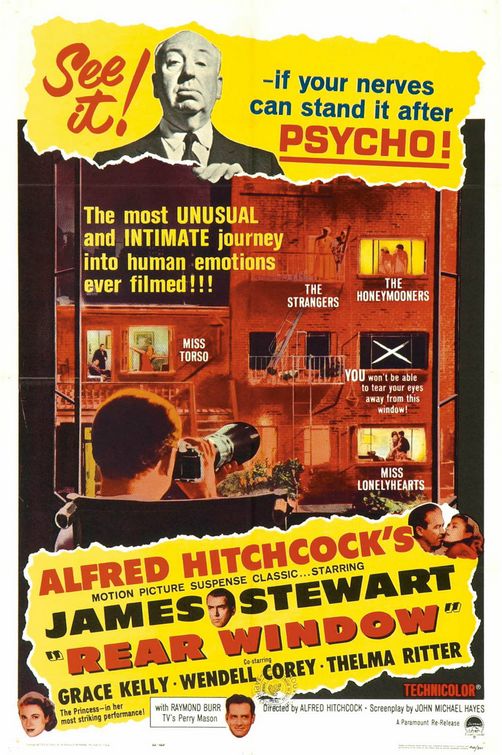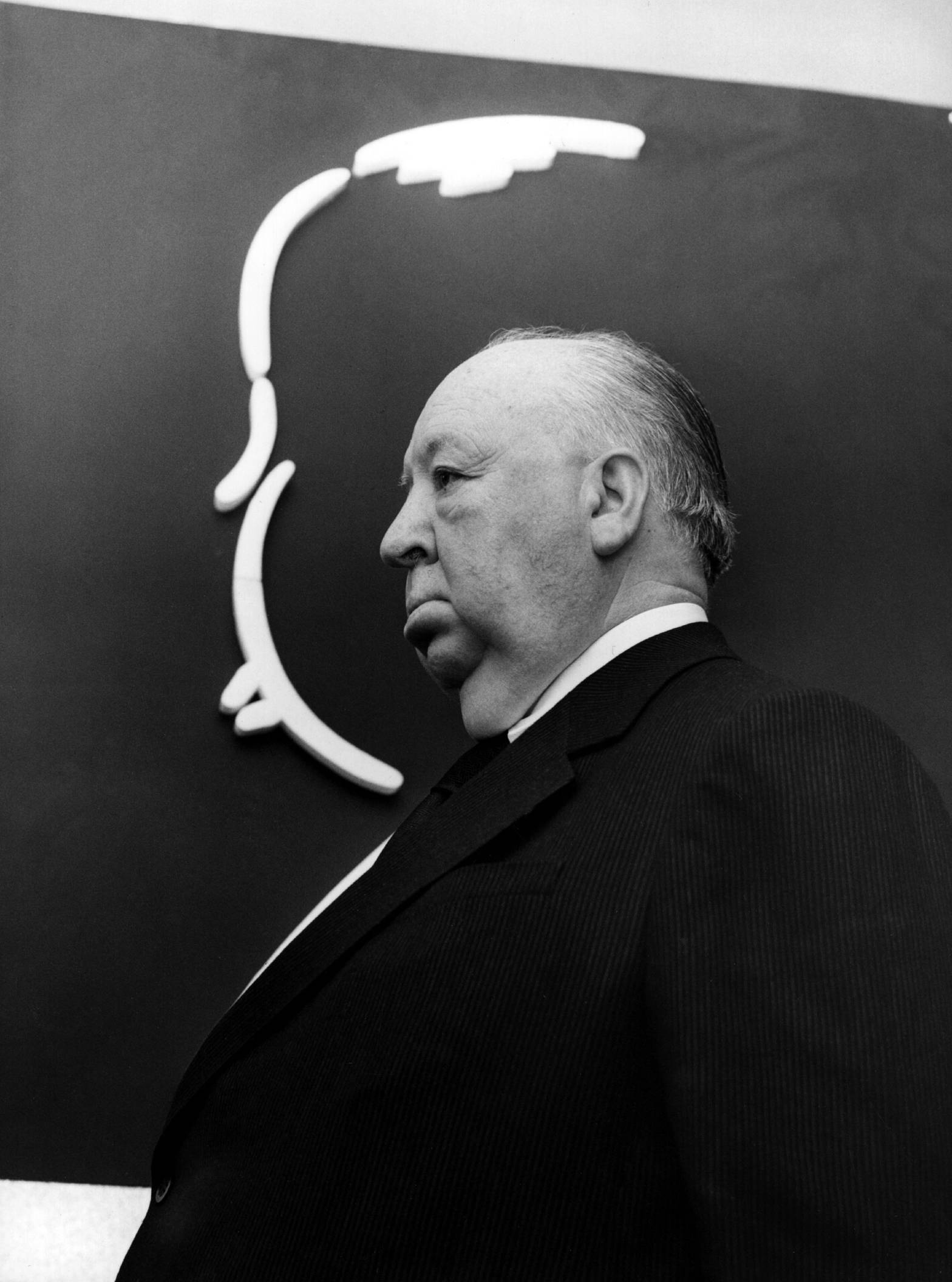Rear Window Review
Well folks, I hope you all had a good August 13th. I know I did, I celebrated by watching some of the early stuff after feeling really sweaty from doing yard work, but I felt it was good to commemorate how he got started- oh? What's that? You didn't celebrate August 13th? Well then, I suggest you get the hell out of here and go watch something less demanding to your intelligence:
Well, okay, maybe that's harsh, perhaps I should explain.
August 13th is the birthday of filmmaker Alfred Hitchcock. If you claim to be a movie buff and yet you've never seen a single film by Hitchcock, then I suggest you hang up your badge and never see a movie again for as long as you live.
Alfred Hitchcock is not just the greatest filmmaker who ever lived, he's THE greatest and most inspiring filmmaker who ever lived. Any filmmaker living today will admit to have taken influence from Alfred Hitchcock; Steven Spielberg applied the Hitchcock method when he was struggling to get the mechanical shark for "Jaws" to work and managed to make what was original supposed to be a creature feature into a summer blockbuster. John Carpenter applied the same techniques Hitchcock used to 'invent' the slasher genre with "Halloween." Hell, a long list of horror films that came after 1960 thank "Psycho" for coming about when it did (though you could argue "Peeping Tom" did the same as it was earlier, but that's a different story). Point is, if there's any pivotal singular person in the evolution of film-making that deserves praise, it's flat-out Alfred Hitchcock.
The things Hitchcock did with the camera, it made the audience part of the film, he was able to make the camera become the eye of character and move as such (done in Hitchcock's traditional theme of voyeurism seen in his movies, "Psycho" and "Vertigo"), the exciting thrills of his plots (whether it was a case of mistaken identity or characters on the run, "North by Northwest" and "The 39 Steps") and not to mention, being able to creative the underused system of editing at the time to build tension in scenes ("Sabotage," "Strangers on a Train" and "The Birds").
To commemorate his impact on the film industry, I'm going to review a film of his; a task that is easier said than done since he's made more movies than Steven Spielberg, Martin Scorsese and Woody Allen; so it only seems fitting to pick one in particular that has always been my absolute favorite of his: "Rear Window" a film released in 1954 (released the same year as his other suspense thriller "Dial M For Murder") and originally distributed by Paramount (it's currently Universal Studios) on a budget of $1 million.
Plot: An attempted photo shoot of a race leaves photographer L.B. "Jeff" Jeffries (James Stewart) injured and stuck in his snazzy New York apartment, getting visits from his fashion-obsessed girlfriend Lisa Fremont (Grace Kelly) and Stella, Jeff's nurse (Thelma Ritter) who checks on him daily. Since there is so very little for him to do, Jeff spends his time looking out his window and looking at his neighbors; a struggling musician, a lonely dancer waiting for her husband to come home, a sculptor and a few married couples; one such couple includes Lars Thorwald (Raymond Burr) and his argumentative wife. The next day, Jeff notices the wife is not in the apartment and finds Lars cleaning off tools in his sink, convincing Jeff that Lars Thorwald has killed his wife. Can he convince his friends and loved ones of Thorwald's crime before he gets away with it or is Jeff just being paranoid?
One word can only describe the premise for this film:
Brilliant.
It's so simple a premise; a guy stuck in his home sees a man acting suspicious and giving hints that he may have committed murder, it's positively brilliant. Made even more so by the restricted limitations of the camera placement; the camera follows the character and since the character is restricted to the room, we, the audience, are also restricted to said room and all information that Jeff learns, we learn. Hitchcock's clever use of allowing us the audience to see through the binoculars and see what Jeff sees may not sound that unique now, but consider what impact that leaves for an audience in the 1950's. It must have really been fresh for audiences to have to see what the character is describing to another.
There's also a great sense of mystery behind the murder. Jeff tries to convince his detective friend (Wendell Corey) that something suspicious is going on, but the detective looks into it and only finds all these logical explanations to the wife's disappearance, like that she was so sick she had to be taken to the hospital and that he was receiving a large package from the train. These suggest Jeff's observations are possibly exaggerated, something that continues to show the brilliance in this sinister situation.
I do admit, I find the whole relationship problem Jeff and Lisa to be, well, out of place compared to the murder mystery of the main plot. But it adds levity to the suspense and character development to the main character.
Characters:
James Stewart: Jimmy ain't my favorite actor from the Golden Age [cough*cough*Edward G. Robinsoncough*cough*] but his nervous persona always managed to find the right roles that tickled my fancy. I'm impressed how much Jimmy was able to emote being limited the wheelchair like he does for the majority of the film and yet his nervous persona helps to lead into the suspense elements to bring tension, like when he sees his girlfriend being attacked by Thorwald and the look of helplessness in his eyes without he fear of losing her. His nervousona does make the romantic angle more awkward than needed, but that's just something I never particularly liked about Jimmy Stewart in romantic situations. Regardless, he plays it straight and I admire how he acts as a channel for the audience to experience what he experiences, a similar experience I found in "Vetrigo," at least to me.
Grace Kelly: I find it ironic that Hitchcock was married to a redhead and yet he used blondes in his movies the most. I confess, I never found Grace Kelly to be as drop-dead gorgeous as film buffs and fans of this film say, but then again, I've never really been into blondes (blame genetics; a majority of my family members are blonde and or blue-eyed, I'm the odd one of the bunch). Regardless, I find her acting to be a mix of great next to all right. The great parts of her performance come when she's invested in the mystery, she especially adds to the tension when she climbs into Thorwald's apartment to search for the body and Thorwald comes back to find her; that is suspenseful and intense. The parts I find her okay are her love moments with Jeff and how they are trying to sort them out to be, well, uninteresting to me. I dunno, compared to the relationships Hitchcock established in films like "Notorious" or "Vertigo," the relationship doesn't feel all that natural, but they are a couple with a relationship on the rocks, so I guess it's just as appropriate.
Raymond Burr: This guy is really, really creepy. The way he stares at Jeff near the end when Jeff looks at him through the extended camera lens, it sends shivers down my spine every time. It's quite an eerie performance, all of which he does physically with little dialogue. Most instances, he plays it unassumingly, almost casually. Near the end of the film, he practically becomes a monster when he approaches Jeff's apartment and slowly makes his way over to Jeff as Jeff uses his flash bulbs to distract him long enough, he's no Norman Bates but oh man he really creeps the hell out of me in this movie. Thorwald really set up the casual and unassuming killer that Hitchcock would integrate into "Psycho," but he's a little too obvious, I guess it's his face. The first time I watched this movie some odd years back, I could tell this guy was going to be a murderer and what do you know, I was right. Still, the demeaning presence he gives off in this film is enough to still give me goosebumps, well done Mr. Burr.
The side characters are all right, nothing all that Oscar-worthy to me, but still, when you're watching a Hitchcock movie, it's rare to find an actor giving a bad performance and nobody gives a bad performance in this movie.
Production: I still find it brilliant how simplistic the setting itself is; apartment buildings surrounded around this small area that includes a garden. Because of how close together the windows are to Jeff's own window, the neighbors themselves have interesting stories of their own and are wordlessly explored as the movie goes on. The cinematography isn't anything as expansive as "North by Northwest" or "Mr. & Mrs. Smith" (if you're thinking of the Brad Pitt and Angelina Jolie film was based on this, no, you'd be mistaken) but it's close neighborhood setting really adds to this sense of peril to being surrounded by all these people and yet nobody could hear or pay attention, it's just as terrifying as being int he same room with a murderer grabbing your arms. The music? Franz Waxman really creates the vibe of New York on a summer day in the right scenes and finds ways to make the music tense when it calls for it. The jazz really helps in the more subtle and calm parts of the film but also elevates the tension during said tense moments, namely this scene where Stella and Lisa sneak down to the flower garden to dig up the body, but find nothing. The jazz really plays with the scene, giving some sense of security but the imagery suggests otherwise.
Oh, by the way, if you're ever watching a Hitchcock film, play "Find Hitchcock," it's so much fun. Here's how it works; because Hitchcock's fans loved seeing him cameo in his films, it became a regular thing for him to do. So, the next time you watch a Alfred Hitchcock film, keep your eyes peeled for this famed director (hint, he'll be wearing a night robe) good luck!
Bottom Line: Just like Hitchcock's many many other movies, with each viewing, they seem to get better and better every time. "Rear Window" is, to me, Hitchcock at his prime, the direction is incredible, the camera-work is superb, the acting is solid; this whole film is perfection, perfection, perfection. I love this film so much, I even got a poster of it and had it framed in my bedroom right on the opposite wall of my bed, every morning when I wake up; I wake up to find James Stewart looking at me with those binoculars in his hands while Grace Kelly watches on. I won't argue and say his other films like "The Man Who Knew Too Much" or "The Lady Vanishes" or "Rope" aren't as good, because they just as amazing movies. For me, it comes down to taking something so simple and identifiable as being stuck in one place and looking over your neighbors and getting the idea that something is amiss with that one guy across the street or that angry woman who lives next door. Point is, I loved this movie the first time I saw it and it grows on me more and more every time I watch it. Oh yeah, this film was remade in 2007 going under the name "Disturbia," well, it was a good update for modern times, but nowhere near the master's original work.
Final Rating: 5/5 Magnifico!
Until next time, I'll continue to stoke the fires for when we burn through celluloid.



























